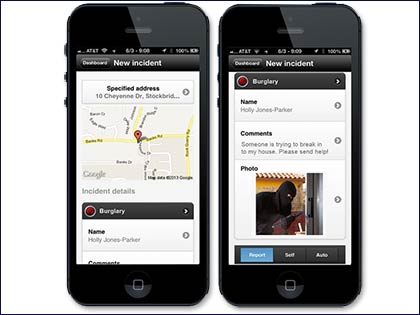By Rivka Borochov
Police and paramedics in Nigeria, organizers of a PGA golf tournament in Maryland, firefighters in Missouri, and volunteer rescue services in Israel can now all use their smartphones to keep safe and save lives.
The Israeli company NowForce is providing all these customers with a smartphone, cloud-based dispatch and a reporting application for security and emergency response.
NowForce can keep first responders connected at all times to their organization, even in off-duty situations or when away from their vehicles, while respecting personal privacy at the same time.
“If I have an off-duty firefighter only five minutes away, I can send an alert,” says Julie Zuckerman, the VP of marketing for NowForce.
She explains that the founders of the Israeli company were inspired to develop the application after United Hatzalah, an all-volunteer emergency response team based in Jerusalem, asked for a tool to speed response times.
United Hatzalah sends trained neighborhood-based first responders all over Israel to the scene of an emergency before paramedics can get there by ambulance. The volunteers on foot or ambucycles receive alerts according to their area of specialty and geographic location, and are dispatched via NowForce to reach the victim in minutes.
Zuckerman explains how it works: “During a medical incident, NowForce would dispatch paramedics with certain expertise. This can be used during recruitment efforts, to enlist only the doctors and nurses with their required specialties in, let’s say, orthopedics or cardiology.”
Alert at college
In Israel, the app is also used to monitor groups of tourists while out on hikes. “If there is a weather situation or conflict concern, we can press one message out to the group in the field, or we can receive distress calls from them,” Zuckerman explains.
Messages can be received in two ways: either from the member of the group who is part of the NowForce team, or through a second app available for community members connected to the specific NowForce team.
NowForce has potential to make college campuses safer, says Zuckerman. Instead of having to find emergency call boxes installed throughout a campus, a student in distress would just have to press one button or swipe an icon on his or her smartphone in order to summon help. This can be done silently or even when in hiding, via an SMS or image.
NowForce triangulates and finds its callers quickly by connecting with the GPS signal and integrating all sorts of open-source information such as Google Maps.
The solution costs only dollars per month per user, making it ideal for volunteer forces -- like the firefighters in Boone County, Missouri, who don’t have the millions it would take to build a dedicated call center.
Helping volunteers and developing nations develop
The Boone County Fire Protection District is now dispatching about 250 volunteer firefighters and emergency response teams from 14 units.
“NowForce locates and dispatches nearby potential responders, thereby shortening the time between when a 9-1-1 call is placed and when a fire/rescue unit arrives,” Boone County reported.
“A few examples from the last month include a medical emergency in which fire and rescue volunteers arrived in two minutes and 56 seconds, and a vehicle collision in which the volunteers arrived in four minutes and 42 seconds.”
“At NowForce, many of us come from backgrounds in public safety, and our solutions are all designed with one purpose in mind: to save lives,” says NowForce CEO Assaf Shafran.
In Nigeria, NowForce is working through a third Israeli party with local authorities to upgrade a poorly organized dispatch system for police and public safety agencies. And the market for technologies like these will only grow in Africa, where it is more common to own a cell phone than a landline or computer.
 Deployment in the palm of your hand
Deployment in the palm of your hand The app also is ideal for one-off and short-term events such as sports tournaments, where security is critical but where teams cannot afford elaborate systems.
“This is a web-based dispatch system. You don’t need hardware,” says Zuckerman.
The AT&T National Golf Tournament in Maryland, part of the PGA Tour, was one such customer that used NowForce as a “rescue service,” Zuckerman says.
NowForce, which was founded in 2008, employs 20 people and is based in Jerusalem, with an office in Washington, DC.